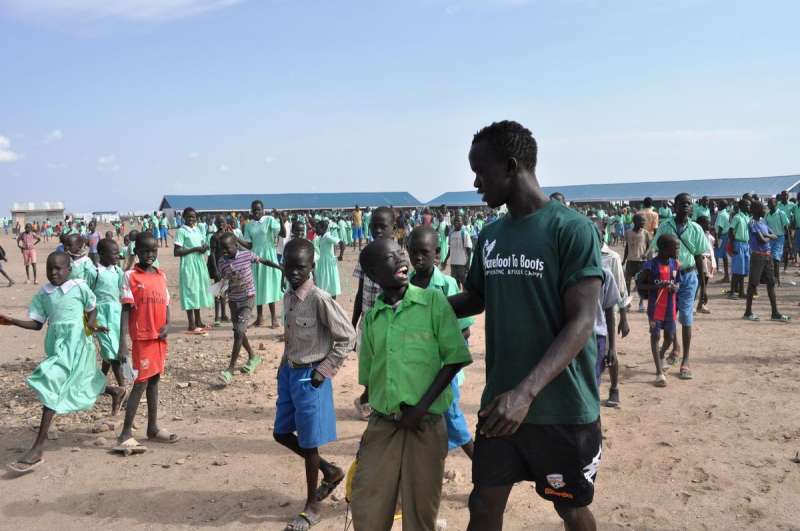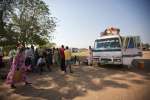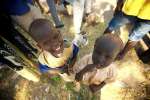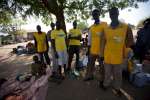Australian soccer star returns to Kakuma to launch powerful initiative
News Stories, 10 July 2015
KAKUMA REFUGEE CAMP, Kenya, July 10 (UNHCR) – Awer Mabil, now a star player at Australian top league soccer club Adelaide United, was born and grew up in the sprawling Kakuma Refugee camp in northwestern Kenya where he honed his skills on one of the toughest playing surfaces in the world.
Now, 19, he has never forgotten kicking balls – some home-made – with his friends across the dusty, scorching-hot river beds of that inhospitable landscape.
"I used to play football every chance I got," he says. "That was all that my friends and I could do for fun."
This June, Awer Mabil, who was resettled in Australia in 2006, fulfilled another dream when he returned with his elder brother Awer Bul, to launch a powerful scheme to help today's young refugee players called "Barefoot to Boots."
Bul was among the first group of Lost Boys to be resettled to the United States in 2002. He moved to Australia three years ago to be close to his younger brother.
"I wanted to be close to Mabil and talk to him about returning to Kakuma," he said explaining that both remained close to their roots despite new lives.
The brothers who fondly refer to each other as "Awer Big" and "Awer Small" first returned to Kakuma in 2014 – a trip down memory lane which reminded them of the needs of young refugees.
On that occasion, they brought 20 football kits and a few footballs. "We had a hard time sharing them out," says Bul. It took over five hours to distribute the kits and some of the youth left unhappy. "Seeing the disappointment in their faces left us with a burning desire to want to do more."
When they returned to Australia, Mabil and Bul started thinking of ways to start an initiative that would appeal to people to donate towards their cause.
"I kept remembering how my friends and I would play barefoot in the hot sun and sometimes get hurt by rocks and thorns," says Mabil.
This is the case for majority of the youth who play barefoot or wear plastic shoes as they cannot afford good leather boots. The idea of "from barefoot to boots" was born. After months of networking and reaching out to various individuals, they finally met Ian Smith, a prominent businessman and lobbyist who was instantly won over by the brothers' idea.
Together with Rachael West, a former diplomat and Osama Malik – Mabil's teammate and best friend – the brothers gathered over 300 kilograms worth of football kits and boots.
It is with this substantial consignment that the brothers and Smith approached UNHCR for support in facilitating their mission to Kakuma.
Mabil and his team arrived in Kakuma with great expectations and the hope that this trip would be different. They met with youth groups from across the camp including football teams from the local Turkana community.
"I have always considered myself a Turkana," Mabil said during one of the friendly matches with the host community teams. "I was born here so naturally I feel connected to Kakuma. What this community has done for refugees inspires me and I feel indebted to you."
Mabil and his team were able to speak to refugees from various nationalities and listen to their stories. They also visited some facilities in the camp including the newer and older schools where they witnessed firsthand the challenges of education in the camp.
At one school, the brothers and their friends were overwhelmed by emotion as they met relatives whom they hadn't seen in over 10 years. "If at any point in time we didn't have a clear understanding of what brought us here, now we do," Malik said after witnessing an emotional reunion between Mabil and his cousin, who now teaches at a primary school.
Mabil hopes to return every year to distribute more football kits and also support other sports and arts activities for youth.
Smith also emphasized his long-term commitment to the project.
"I have spoken with various organizations that are fully committed to supporting this wonderful initiative," he said. The Australian national airline Qantas and the National Football Federation back the project. "If possible, we would like to ship kits and boots to Kakuma every six months," he explained.
UNHCR has also pledged support for the initiative.
"As UNHCR, we will continue to work with you and support such initiatives which contribute positively to the lives of refugees and the host community,"
Fortunata Ngonyani, Officer in Charge at UNHCR Kakuma office, told them before they left again.
She also thanked the Lutheran World Federation and the Danish Refugee Council for supporting the mission in Kakuma by bringing sports teams together.
"This has been an overwhelming trip and I cannot wait to come back and do much more," Mabil said. "Barefoot to Boots is not just about football, it is about its potential as a powerful tool for bringing people together. I would like to use it to address other issues that concern refugees."
By Cathy Wachiaya in Kakuma Refugee Camp, Kenya






















































